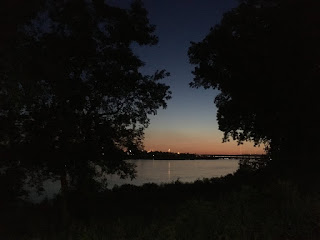It rained a little bit on our way into the state, which was actually a bit welcome because it took a lot of bugs off of the windshield lol.




I like photos of the sky, sue me. And as you can see, it cleared up by the time we arrived the city itself
(I like to say that I bring the sunshine with my bubbly personality but I try to remain humble).
I wanted to get to the venue for the night by 6pm so as to be able to participate in improv exercises open to the general public but time was not on my side.
But that is okay! You just gotta roll with the punches sometimes, as I've grown up that staying upset and pouting is not as productive as my childhood led me to believe. Look! I'm adulting.
So we arrived at our hotel in Denver, and it was pretty nice, to be honest.
--okay maybe my perception of the hotel was influenced by the fact that I found the young woman at the front desk attractive, but I am only human--
We unpacked, and soon afterwards it was showtime! (not for me, of course, but for the show itself)
My boss, Diversity and Inclusion Board Chair at Claremont McKenna College, the incomparable Maya Love '20, is a native of Denver, so I invited her and her friends to the show as well, also giving me an opportunity to conduct some interviews.


From left to right (on the photo on the right): Maya, Nizhooni, Genesis, Damaria.
Back to the show. It was an interesting form of comedy that night. It was a troupe called Hit and Run: Musical Improv, which is pretty self explanatory. They take suggestions from the audience similarly to a usual improv group, but for a title of the musical, and I am unsure but I think also a genre and a beginning location.
It. Was. Amazing. All of five performers on stage and their offstage pianist are so talented, especially when you take into consideration that all that they were saying was off the top of their heads, including the songs!
Sure they were a bit choppy here and there, but they were able to sing in sync and have an intro/hook/chorus to their songs, and I was thoroughly impressed. It might not have been telling much of the community values, but it was an entertaining outing.
Afterwards, it was out to overpriced pizza (gentrification is a trip) with the young women pictured above and my father.
The pizza was not worth the charge but I was hungry so I was complicit in being finessed by this business establishment.
Then it was interview time.
Admittedly, I'd always thought of Denver as some White, mountainous, Patagonia-wearing, coffee-loving, fairly well off enclave that was detached from the issues of those of marginalized identities, but that could not have been further from the reality of the two Denver residents I had the opportunity to interview.
They spoke of deep, intersectional issues. From poverty and homelessness, to gentrification and a changing of the culture, they expressed the visible shifts in their hometown. I also learned about their more personal ventures, from getting people of color more involved in the generally-seen-as-the-embodiment-of-Whiteness outdoors and nature, to the representation of women (especially women of color) in positions of power at local or more far-reaching scales.
I often find myself conversing with people on the receiving end of gentrification and other cultural erasure methods, and they all meet these community-based changes with reluctance. I totally understand why, and I find that Denver is actually a bit of a different case. I say this because it is not just White people moving in and bringing their small businesses that drive up housing costs and such of the like, but also a development of the city. So as they are trying to attract new businesses to bring in more revenue for the city, they are developing and pushing out populations of people that have resided there for a while already (in particular the homeless population).
So now the question is how do we move forward while ensuring that we don't leave already institutionally disadvantaged populations behind?






























